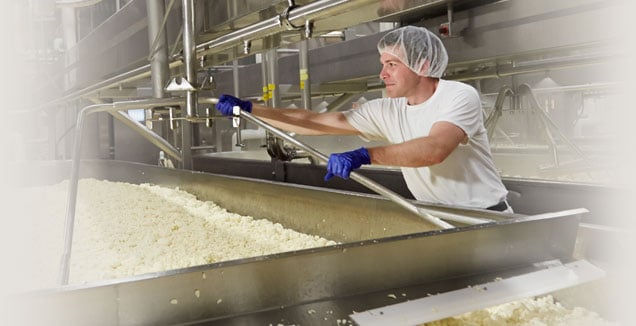Cheese Factory Melbourne: Experience the Art of Cheese
Cheese Factory Melbourne: Experience the Art of Cheese
Blog Article
A Comprehensive Look at Cheese Manufacturing: Active Ingredients, Techniques, and the Future of Artisan Cheeses
The elaborate procedure of cheese production is a remarkable merging of art and science, where premium milk, rennet, and certain bacterial cultures offer as fundamental aspects. As the industry progressively focuses on sustainability and openness, the future of artisan cheeses assures to mirror both heritage and development.
Trick Ingredients in Cheese Production
A selection of vital active ingredients play an essential function in cheese production, each contributing to the end product's taste, structure, and personality. The key component in cheese is milk, which can originate from different resources, including cows, goats, and lamb - cheese for sale online. The kind of milk used significantly influences the cheese's preference and consistency; as an example, cow's milk commonly yields creamier cheeses, while goat's milk usually produces tasty ranges
Another crucial component is rennet, an enzyme made use of to curdle the milk, dividing it right into curds and whey. The resource of rennet can be animal, veggie, or microbial, each presenting distinct attributes to the cheese.
Salt not only improves the taste however likewise works as a chemical, inhibiting the growth of unwanted bacteria. Additionally, numerous flavoring representatives, such as herbs, spices, or even smoked wood, can be contributed to develop special artisanal cheeses. Together, these ingredients develop the structure of cheese production, establishing the stage for varied and rich cheese varieties.
Standard Cheese-Making Methods
Using traditional cheese-making methods, craftsmens around the globe protect classic methods that have been passed down with generations. These techniques commonly highlight the usage of high-grade, in your area sourced milk, which is main to the one-of-a-kind flavors and textures of artisanal cheeses. The procedure typically begins with the cautious heating of milk, adhered to by the enhancement of societies and rennet to facilitate coagulation.
As soon as the curds create, they are reduced, enabling whey to drain pipes, a vital action that affects moisture web content and appearance. Salting is a vital facet of this process, enhancing flavor while likewise acting as a chemical.
Aging, or affinage, is an additional essential element, during which cheeses create their particular aromas and tastes. Artisans might employ certain maturing atmospheres, using moisture and temperature controls to refine the cheese's account. The commitment to these traditional methods not only sustains neighborhood economies yet also adds to the abundant diversity of cheese varieties located internationally, celebrating social heritage and artisanal craftsmanship.
Modern Innovations in Cheese Manufacturing
Just how have technical advancements transformed cheese manufacturing in recent years? The integration of modern-day innovation has transformed both the efficiency and quality of cheese production.
Furthermore, innovations in microbiology have actually enabled cheesemakers to select particular microbial cultures and enzymes, optimizing flavor profiles and boosting shelf life. Using sensor innovation for checking fermentation conditions has actually likewise become common, enabling real-time adjustments to see this site maintain optimal atmospheres for cheese aging.

These developments not only enhance the high quality and sustainability of cheese manufacturing however additionally encourage craftsmen producers to preserve typical flavors while accepting modern-day performance. As modern technology proceeds to develop, the future of cheese production looks promising, blending custom with development.
The Function of Terroir in Cheese
In the realm of cheese production, terroir plays a crucial role in defining the distinctive characteristics of various cheeses. Terroir, a French term traditionally related to wine, encompasses the environmental aspects that affect farming products, including dirt structure, environment, and neighborhood vegetation and animals. In cheese-making, the unique attributes of the region where the milk is sourced can convey certain tastes and appearances to the final item.
For circumstances, the grazing conditions of dairy animals considerably affect the milk's composition, affected by the kinds of yards and natural herbs available in a certain place. This differs not just in between nations yet also in between areas within the same country. In addition, the microbial communities existing in the environment add to the fermentation procedures, leading to varied accounts in taste and scent.
Cheeses such as Roquefort, Parmigiano-Reggiano, and Cheddar exhibit exactly how terroir can form their identifications, making them distinctive and frequently shielded by geographical indicators. As manufacturers significantly identify the relevance of terroir, there is an expanding focus on sourcing neighborhood active ingredients more tips here and keeping typical techniques, guaranteeing that each cheese truly mirrors its origin.

Future Trends in Artisan Cheeses
A notable change is taking place in the craftsmen cheese market, driven by advancing consumer preferences and technological improvements. Progressively, customers are inclining one-of-a-kind, premium products that emphasize both sustainability and neighborhood sourcing - cheese for sale online. This trend is triggering artisan cheesemakers to innovate, concentrating on small-batch manufacturing and the usage of traditional techniques while incorporating modern-day technology to enhance high quality and security
Moreover, there is an expanding rate of interest in plant-based and different milk items, pressing traditional cheesemakers to discover brand-new opportunities, such as cashew or almond-based cheeses. This change not just accommodates dietary constraints however likewise aligns with ecological worries regarding animal agriculture.
Furthermore, openness in sourcing and manufacturing processes is coming to be paramount. Customers are much more educated and need traceability, motivating manufacturers to adopt more clear labeling techniques and participate in narration that highlights their approaches and values.
Conclusion
Finally, the intricate procedure of cheese production blends standard strategies with modern developments, causing a diverse range of tastes and structures. The focus on top notch ingredients and the impact of terroir review underscore the artistry included in cheese production. As the industry evolves, a concentrate on sustainability and transparency will likely shape the future of artisan cheeses, catering to a significantly discerning consumer base that values credibility and workmanship in milk items.
Report this page